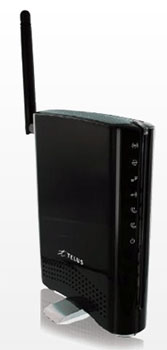When you wanted to just plug in to a wall and create an instant WiFi network with broadband Internet and voice calling, there used to be just one game in town.
But now Rogers’ Rocket Hub has some competition. Telus Mobility is selling the Smart Hub, the second “magic box” on the Canadian market that is capable of creating a WiFi network for up to 15 devices – just add electricity.
The Smart Hub can also connect one computer via an Ethernet cable, and can support two landline phones. Everything offered through the device is run on Telus’ 3G+ HSPA network, offering 7.2 mbps download and 5.76 mbps upload speeds.
Slick out of box experience
The selling point of the Smart Hub is its ease of use combined with its broadband speeds. There’s no software needed to install to make the router work. Just plug it in and it creates a WiFi network, and you connect to it the same way as you would any wireless router.
This was pretty much my experience out of the box. But I did take the time to connect to the router via a direct line and configure it using a Web browser. This gave me an added level of customization for naming my network and setting my security password, but it’s not necessary.
The speeds offered by the Hub are great. In fact, it is faster broadband than is offered by my at-home DSL Internet service provider. I moved the Hub around to see if network reception would affect its speeds, and found that best results were achieved when the reception meter is at two bars or higher. Use the included antenna for best performance.

The Smart Hub features the latest wireless standard (802.11n) and I found it supported several devices without a problem.
Wireless freedom isn’t free
The cost of the hardware itself is reasonable, at $399.99 with no contract or $149.99 with a two year contract. But the cost of connectivity is fairly high when compared to other options for broadband access.
Telus offers a tiered access plan dubbed “Cost Assure” for the hub. This provides users some level of protection from stiff over-usage penalty costs. Hub users start with the “Base” plan of $35 per moth for up to 3 GB of data, but if they exceed that ceiling they will be charged $45 for up to 5 GB per month for “Tier 1”. Transfer more than 5 GB, and pay $60 for up to 10 GB in data. Every gigabyte after that will cost $15.
Smart Hub users accessing voice features will pay more. The “Base” plan costs $90 per month, the “Tier 1” plan $100 per month and “Tier 2” for $115 per month. The voice features include 10 voicemail messages, caller ID, call waiting, and in-Canada long distance calling (excluding Yukon and Northwest Territories).
Costs for U.S. roaming are an extra $3 per gigabyte.
Not surprisingly, the data rates almost mirror Rogers’ Rocket Hub plans. Rogers offers lower prices on the voice and data plans, but those plans don’t include long distance, and comes with fewer features.
Other similarly priced broadband Internet plans can get a business about 10 times the amount of data transfer offered here, or even unlimited data transfer. But those are permanent connections that must stay in one location and don’t offer the wireless portability of the Smart Hub – freedom isn’t free.
When combined with the voice services that includes long distance across Canada’s provinces, the price points are more palatable.
Good for some, not for most
The convenience and speed offered by the Smart Hub makes it a great choice for businesses in certain specific situations.
If your business has mobile teams that could benefit from a broadband Internet connection, then this is perfect. Road warriors need only to find the nearest outlet to plug into and start working, or even buy the right adapter for their car to have a WiFi hot spot on wheels.
Or if your business operates out of a remote area that doesn’t have easy access to landline broadband Internet such as DSL or cable, then this is definitely worth considering. The Telus Smart Hub or the Rogers Rocket Hub offers a reliable way for even the most remote country-side businesses to get Internet and phone services.
Many professionals may also be tempted to plug one of these into a cottage somewhere, buying the Smart Hub off contract and then subscribing for only the summer months.
But overall, this isn’t going to replace most business Internet connections. The speed is there, the convenience is top-notch, but the price just doesn’t make sense – yet.
Brian Jackson is a Senior Writer at ITBusiness.ca. Follow him on Twitter, read his blog, and check out the IT Business Facebook Page.




